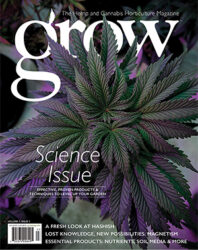With the widespread legalization of cannabis, more opportunities arrive each year for research on this amazing plant. As scientists dig deeper into the fascinating cornucopia of chemicals found in cannabis, they continue to uncover new and interesting finds. Today, the cannabis and hemp industries are abuzz with an interesting new cannabinoid curiously referred to as “diet weed.” This novel cannabinoid is formally referred to as THCV, Δ9-tetrahydrocannabivarin, or just tetrahydrocannabivarin.
What is THCV?
THCV is gaining renown because it shows interesting promise as both an appetite suppressant and stimulant. THCV is recognized alongside cannabidiol (CBD) and delta-9-tetrahydrocannabinol (THC) as one of the primary cannabinoids found in the cannabis plant. The “delta” part of the name is sometimes written as Δ.
In a fashion similar to CBD, researchers have long known that THCV exists. Yet, the cannabinoid has largely been overshadowed by its more popular and well-known psychoactive cousin, THC. Since recent lab studies show that THCV may have quite unique and miraculous properties, the cannabinoid now represents one of the fastest-growing segments in the cannabis industry.
Is THCV Federally Legal?
When the federal government passed the 2018 Farm Bill, they legalized the cultivation and possession of cannabis containing less than 0.3% THC. With this historical legislation, any cannabis strains containing less than 0.3% THC were to be referred to under the umbrella term of “hemp.” As a result, the same legislation that ushered in the CBD industry also legalized THCV in the United States.
What is Unique About THCV?
While THCV might sound quite similar to traditional THC by name, there are distinct chemical differences between the cannabinoids.
Non-Intoxicating
One of the most interesting things about THCV is the fact that the cannabinoid is non-intoxicating. In fact, the study “Δ9-Tetrahydrocannabivarin (THCV): a commentary on potential therapeutic benefit for the management of obesity and diabetes” taken from the Journal of Cannabis Research tells us: “Unlike THC, which is psychoactive and an agonist at the CB1 and CB2 receptors, THCV is a non-psychoactive, neutral CB1 antagonist / reverse agonist.” In other words, not only is THCV non-intoxicating, but it actually lessens some of the psychoactive effects that normal THC has on the CB1 receptors in the human brain.
Appetite Suppressant
Some of the most interesting findings around THCV have to do with the cannabinoid acting as an appetite suppressant — this too seems to be another connection with the CB1 receptor. A recent study titled “Cannabinoid Receptor Signaling in Central Regulation of Feeding Behavior: A Mini-Review” found in the Frontiers of Neuroscience journal puts it this way: “The promotion of CB1 signaling [with normal THC] can increase appetite and stimulate feeding, while blockade of CB1 suppresses hunger.”
While popular culture has long associated cannabis with “the munchies,” it seems that THCV might have the complete opposite effect. Now being referred to as “diet weed,” THCV may be a legitimate, all-natural weight-loss drug. Undoubtedly, the cannabinoid would be a welcome alternative to harsh, synthetic diet pills.
Energizing Effects
Another popular theory surrounding THCV is that the cannabinoid produces energizing effects. While many theories on THCV are backed by legitimate scientific research, claims of stimulating effects seem to be a bit more conjecture-based. When perusing the internet, it’s easy to run into strain descriptions by cannabis companies that mention the uplifting effects of THCV. For example, the Cresco Labs website describes THCV as a “cannabinoid found most prevalently in Sativa strains of cannabis. It is known to produce a more motivated, alert and energizing feeling.”
While it’s entirely possible that THCV does have energizing properties, it might be tough to pinpoint the cannabinoid as the specific source of energy in sativa-dominant strains.
What Types of Cannabis Contains THCV?
THCV has traditionally been a difficult cannabinoid to find. According to Lester Black, who wrote an article about THCV for SF Gate, “Most cannabis plants do not produce this compound, and experts have traveled around the world looking for ones that do.” While THCV can be theoretically grown in hemp plants containing under 0.3% THC, there isn’t much evidence online or anywhere else that supports the existence of THCV hemp strains.
There are a few popular cannabis strains that are known to contain both THC and THCV, including Durban Poison, Jack the Ripper, Pineapple Purps, and Pink Boost Goddess.
Where Can You Purchase THCV Products?
With such a growing interest in THCV, many hemp and CBD companies have begun synthesizing the cannabinoid in the laboratory. While it’s still somewhat difficult to trace back the source of these products, you can purchase THCV online and at CBD shops in the form of vapes, gummies, and capsules.
If you are interested in purchasing cannabis products with THCV and more than 0.03% THC, you will have to visit a cannabis dispensary. Of course, product availability will be dictated by different state laws. Cannabis companies are developing THC and THCV products that claim to quell the munchies that normally come with cannabis.
Revealing Mysteries
The more we learn about the cannabis plant, the more mysteries it seems to present. Today, THCV is overturning many of our preconceived notions of how cannabinoids function in the human body, especially concerning appetite suppression. When it comes to the endocannabinoid system, THCV almost seems to work the opposite of THC. With synthetic diet pills being addictive and often leading to a host of dangerous side effects, THCV shows real promise as an all-natural weight loss drug. Yet, as seen with anything cannabis-related, we will have to wait and see how new legislation and scientific research inform our future understanding of THCV.


